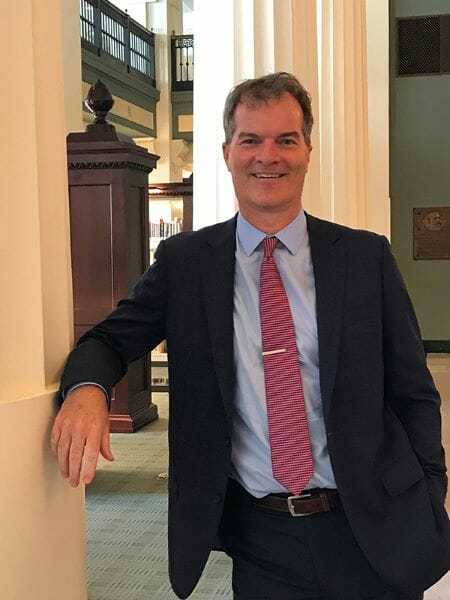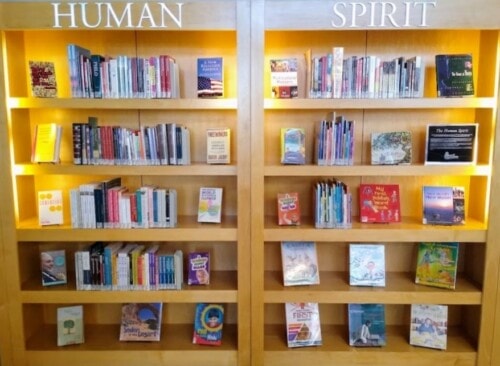Kansas City Public Library Grapples with Digital Publishing Local Institution Marks 150th Anniversary This Year
Published April 12th, 2023 at 6:00 AM
Above image credit: The parking garage at the Kansas City Public Library in downtown Kansas City features the spines of famous books. (Kevin Collison | CirtyScene)The Kansas City Public Library opened its doors when our river city was a cowtown home to 32,000 souls and Ulysses S. Grant was president.
Today, it must meet the demand for digital tablets and lunches for indigent local school kids while a digital book revolution slams its budget and limits the breadth of its collection.
Let’s not forget the rising pressure to limit access to certain kinds of books in our evermore fractious society.
Librarians today are in a fray few appreciate. They are no longer the shushing matrons of yesteryear.
It is a brave new world for libraries, said John Herron, historian and director of the Kansas City Public Library, which will mark its 150th anniversary in December.
That transformation of the library world has gone largely unnoticed by many and was accelerated by the COVID-19 pandemic.

“People want our branches to look like libraries,” Herron said. “When you are more than 50% digital you are not going to see it when you walk into your library.”
“We are not a book repository only. We advance cultural opportunity, support for education, public health — the library is doing more and more,” Herron said.
“We are trying to figure out and trigger fuller participation in society,” he said.
Herron, with fresh insights from three years on the job, agreed to give Flatland readers a behind-the-stacks view of the pressures and evolving commitments of one of the city’s most important institutions.
Overarching all is his passion to have the library grow into the leading promulgator of literacy in the city, picking up the baton that may have once been more equitably shared with other local institutions such as the Kansas City Star, which has seen its staff, editorial ambitions and business hemorrhage in recent decades.
Digital Economics
Now it is the library’s turn to be buffeted by its own unique challenges.
Publishers squeezed by changes in their business have in turn squeezed libraries, which make up 9% of all book sales, Herron said.
Readers in Kansas City, like readers everywhere, are increasingly interested in reading their books on digital devices.
As recently as 2010, just 3% of all library book circulation both nationally and locally was digital. That percentage has steadily increased and was given a big boost during the pandemic when the world was locked down and reading time flowered, Herron said.
In 2017 the library had 600,000 digital books in its circulation and 1 million print books.
Just five years later as we emerged from the COVID health crisis, it had 1.2 million digital books in circulation and 900,000 print books checked out, Herron said.
Book publishers also have steadily increased libraries’ costs for accessing digital books, Herron said.
“How do we participate in the marketplace that is becoming increasingly complicated to navigate?” Herron asked.
Here are the numbers that reveal the challenge.
In 2017, the Kansas City Public Library paid $469,000 for its 600,000 digital book circulation.
Last year, it paid $1.2 million for 1.2 million digital copies. That is a 2.5-fold increase in costs in just five years.
“Our circulation budget is flat, but a larger percentage of the budget goes digital,” he said.
Digital publishers have steadily ratcheted up financial pressure on libraries.
“I don’t think the public understands what a license is,” Herron said.
In the first generation of e-books libraries bought a book license for about 26 reads, after which the library would have to buy another license, Herron said.
A decade ago, the license cost $40, $50 or $60 — way more than what it would cost patrons to buy a book for their Kindle, Herron said.
Prices steadily increased.
“Licenses now expire after two years, regardless of the number of checkouts, and can cost $40/60/80 each,” Herron said.
Local Impact
But the publisher’s economics can have perverse effects.
“The example that was used in a congressional hearing and then widely cited in popular media was ‘All the Light We Cannot See,’ a 2014 bestseller by Anthony Doerr. The book cost $12.99 for consumers, versus $52 for libraries for a limited license.
“For libraries, the impact of this rise in cost is a decline in the diversity of back catalogs and a narrowing of the contemporary collection as we are spending more money on fewer books which forces a drift toward more popular titles,” Herron said.
“E-book publishers are unintentionally contributing to a narrowing of a public library’s holdings,” he said.
That in turn depresses the circulation of books.
“Our budget artificially suppresses our circulation numbers,” he said.
“We are not a book repository only. We advance cultural opportunity, support for education, public health — the library is doing more and more.”
John Herron, director of the Kansas City Public Library
The library’s budget has been stable, tied to local property tax revenues which have posted healthy gains lately, Herron said. But budget problems loom.
“Regulating this marketplace has proven challenging,” Herron said. “At least nine states, including Missouri, have considered legislation that would require publishing houses to license e-content at ‘reasonable costs,’ but little progress has been made on this. Publishers are within their rights to set prices.”
“The cost of e-content, which for libraries includes tax dollars from the local community, is soon to outpace their collections budgets,” Herron said. “An additional complicating factor is when publishers or distributors of e-content refuse to sell digital formats to libraries. Library patrons get frustrated with their local libraries when popular titles have long wait times, but in most cases, this is largely a by-product of publisher control of the e-content market, not library policy.”
“A library can take a chance on an obscure title if we buy it in print. But we don’t want to do it digitally.”
Book publishers have crafted their library business to promote book sales to the reading public.
“Macmillan in 2018 issued an embargo and would give a library one copy of a popular book for eight weeks trying to push sales, not licenses,” Herron said.
Members of book clubs and frequent library patrons get frustrated when their desired books are unavailable.
“They say, ‘Oh My God, I am not going to get this book for 26 weeks!’” Herron said.
Meanwhile, nutrition as well as books are getting checked out in libraries. The library, with Harvesters, runs Kids’ Café, feeding up to 150 meals a week to Kansas City children at its branches, throwing in mentorships and adult supervision.
In the summer, that increases to 250-275 children a week being fed at Kansas City libraries.
The library before COVID put a bookmobile back on Kansas City streets for the first time since the 1950s and then added two more bookmobiles to bring more books out into the community. It has launched Books to Give, often giving children their first taste of the joys of owning their own book, Herron said.
The library is also lending digital tablets to patrons who would not otherwise have access to the internet — and demand for them is steady, Herron said. It also lends out internet connectivity via hotspots, small handheld digital devices the size of checkbooks.
“At the Bluford Branch Library at 31st and Prospect, we can’t keep hotspots on the shelf,” Herron said, because of patron demand.
Meanwhile, proposed legislation has been advanced in Missouri that would make it a criminal offense if librarians make sexually explicit materials available to the public, Herron said.
“Missouri is not Florida or Texas, but these stories are on our librarians’ minds,” Herron said.
Now, when librarians come to work, they wonder, Herron said, “If someone asks about LGBTQ books, am I going to get in trouble that jeopardizes my job?”
While much has changed in 150 years, the underlying ethic of Kansas City’s library remains bedrock, Herron said.
“That history has been marked by positive community engagement and outreach from day one.”
Martin Rosenberg is a Kansas City journalist and host of the Grid Talk podcast on the future of energy.



